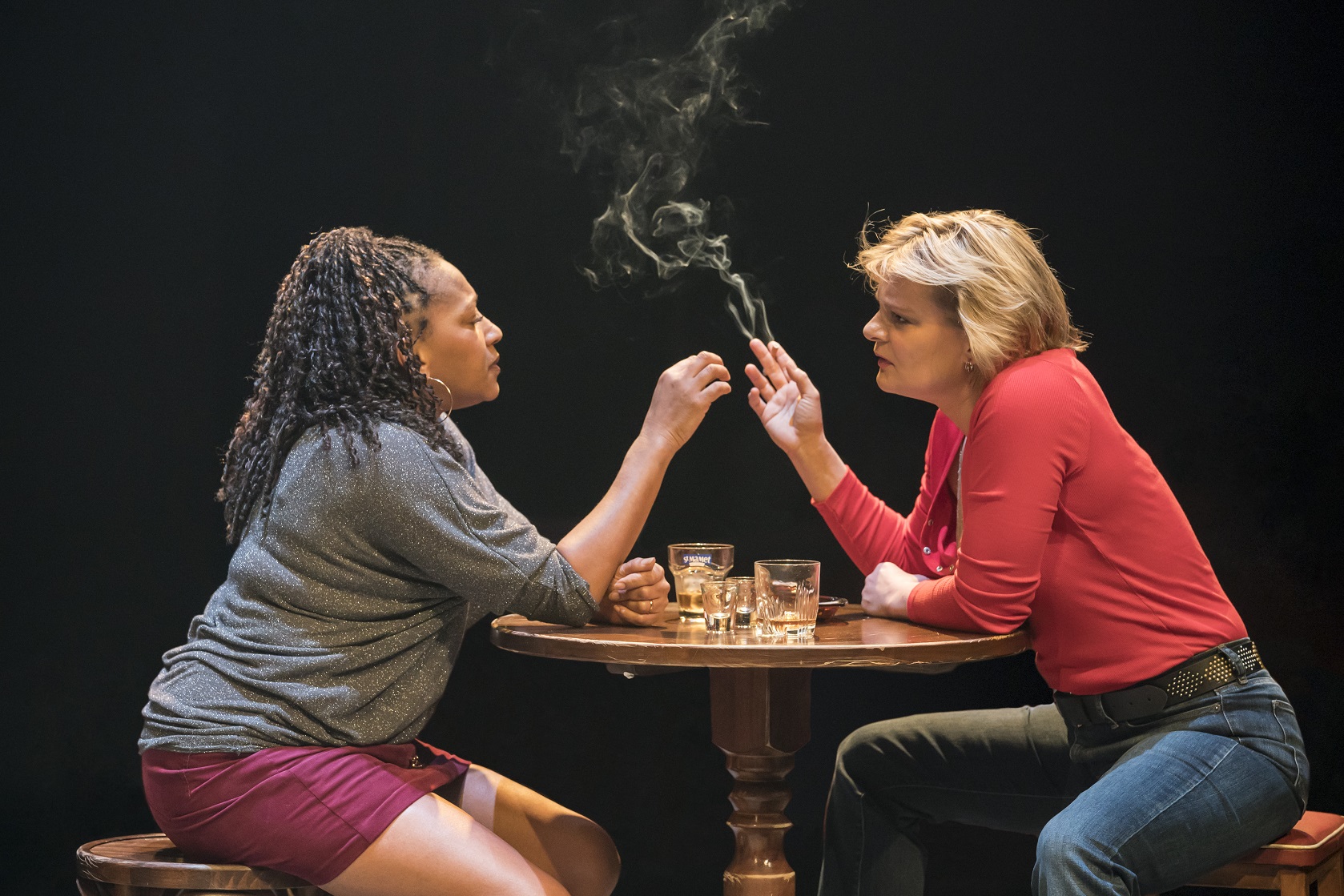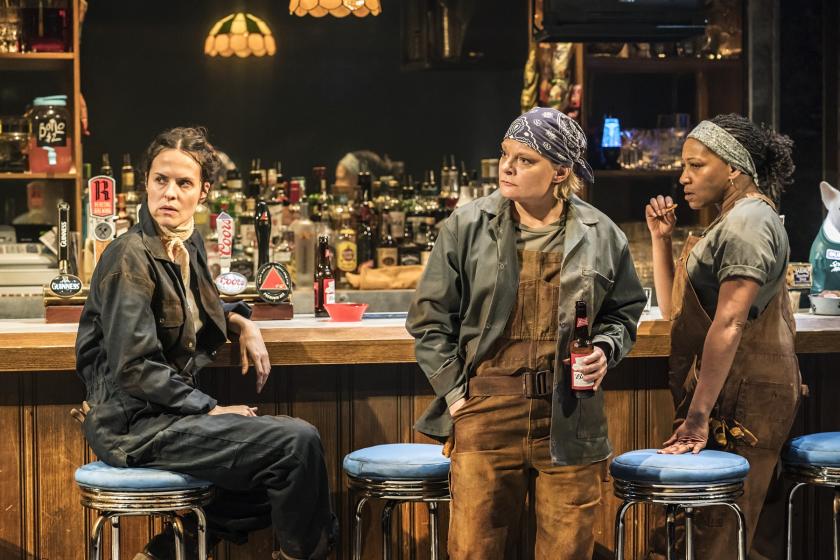There’s a joke early on in Sweat, Lynn Nottage's superlative drama about American working lives, in which a lively bar-room conversation turns to the seemingly unlikely subject of NAFTA. It’s 2000, the Bush presidency just around the corner, and the impact of the acronymic North American Free Trade Agreement is about to hit the country's industrial heartlands. It sounds like a laxative, one character jokes – a throwaway remark that proves to have a bitter truth behind it.
She makes her point succinctly by opening each half of her play with a jump-forward to 2008, showing us the consequences of that destruction. The first, a parole scene, introduces us in parallel to the two young men of the piece, Jason (Patrick Gibson) and his erstwhile best friend Chris (Osy Ikhile), the tensions between them showing now they’re both out of jail. In the mirror scene after the interval, the fraught unease with which each is reunited with his mother brings home the desolation of the life to which they have returned: the coldness with which Jason, his surly anger emphasised by the face tattoos with which he’s come back from prison, reconnects with his mother Tracey (Martha Plimpton) is heart-breaking. (Pictured below, Osy Ikhile as Chris, Patrick Gibson as Jason) The starkness of that framing is made all the more pronounced by the sheer exuberance of what comes in between. The main location of Sweat is Mike’s Bar, where Stuart McQuarrie’s benign bartender Stan plays host to his regulars. Tracey and her best friend Cynthia (Clare Perkins) are clearly among his best customers: they gather there both to mark special events – birthdays are clearly a long tradition – as well as for more familiar after-work chilling. They’re the kind of drinkers who don't turn down one for the road unless, like Jessie (Leanne Best), they’ve passed out on the table already. It’s the drop-in favourite of Jason and Chris, too, while the latter’s father (and Cynthia's estranged husband) Brucie (Wil Johnson) isn’t going to be turned away by Stan either, even though he’s down on his luck and battling drug addiction.
The starkness of that framing is made all the more pronounced by the sheer exuberance of what comes in between. The main location of Sweat is Mike’s Bar, where Stuart McQuarrie’s benign bartender Stan plays host to his regulars. Tracey and her best friend Cynthia (Clare Perkins) are clearly among his best customers: they gather there both to mark special events – birthdays are clearly a long tradition – as well as for more familiar after-work chilling. They’re the kind of drinkers who don't turn down one for the road unless, like Jessie (Leanne Best), they’ve passed out on the table already. It’s the drop-in favourite of Jason and Chris, too, while the latter’s father (and Cynthia's estranged husband) Brucie (Wil Johnson) isn’t going to be turned away by Stan either, even though he’s down on his luck and battling drug addiction.
Nottage’s language is a rich vernacular, its rhythms often loosened by the alcohol, the old familiarity of these friendships making the effect all the more informal still. It’s a memorably inclusive world, the emotional intonations and connections of which are beautifully caught by Lynette Linton’s direction, while Frankie Bradshaw’s bar-room set, extended here from its original home at the Donmar Warehouse, practically has a life of its own. The lively colours of the bar itself stand out against the grey background suggestions of an industrial space, the kind of factory equipment from which Nottage’s protagonists, released at the end of their shifts, escape.
It's redolent of Springsteen for its sense of the angry melancholy of life’s downturns
It’s an environment in which personal identity is bound up indissolubly with the work routine that sustains it. These women have been on the floor of the factory where they work for decades (we never learn exactly what they do, but it’s clearly heavy, demanding work), standing proud in the status that it accords them. For Tracey, it’s third-generation confirmation of her family’s belonging in America; for Cynthia, who’s black, it’s a more recent endorsement, the day on which she received her Union card somehow rooting her anew. Employment at the factory, however much its internal structures are changing, remains a totemic symbol of belonging to which another new stratum of society, the Hispanic immigrant community, now aspires, too, although their inclusion may actually mark the death knell of the old system itself.
Such extension along racial lines isn’t the only way in which the closely bonded group whose fortunes Nottage follows is coming under threat, with opportunities of promotion from factory floor to management proving no less insidious. When an opening comes up, it seems to both Tracey and Cynthia to offer them a chance to stand up for their own people: little can they imagine the perils that follow – the division it opens up between the two women, as well as an eventual enforced betrayal of the class from which they originate. Such, it turns out, were the results of NAFTA, the poison that hit America’s industrial heartland so hard, infecting its society with the angry disillusion that would prove so ready to respond, a decade later, to the promises of Donald Trump. (Parallels with Britain and its own earlier retreat from industrial might are no less striking.) If that makes Nottage’s work sound in some way remote, it’s anything but. Sweat is partially the result of research that the playwright carried out in one particular such community in Pennsylvania, and it’s clear that what she brought back with her from that environment was a profound sense of the human consequences of industrial decay.
Such, it turns out, were the results of NAFTA, the poison that hit America’s industrial heartland so hard, infecting its society with the angry disillusion that would prove so ready to respond, a decade later, to the promises of Donald Trump. (Parallels with Britain and its own earlier retreat from industrial might are no less striking.) If that makes Nottage’s work sound in some way remote, it’s anything but. Sweat is partially the result of research that the playwright carried out in one particular such community in Pennsylvania, and it’s clear that what she brought back with her from that environment was a profound sense of the human consequences of industrial decay.
The result is a piece that’s somehow infused with the presence of that other chronicler of American working lives, Studs Terkel, as well as redolent of Springsteen for its sense of the angry melancholy of life’s downturns. Leanne Best’s Jessie is by far the quietest of the three women, but how poignant and powerful her main speech is, as she recalls past opportunities for escape from this settled world that never came off, whether it was trekking to the wilds Alaska, or further afield, down the fabled hippie trail, all the way to Kandahar, Kabul, Kathmandu.
There are echoes of other American dramatists here, notably Arthur Miller, but Nottage gives voice to her women characters in a way that few have managed so incisively (if there's a shortcoming, it's arguably the lack of adult males who are organically bound up in the drama). The counterpoint to Jessie’s roads never travelled comes in memories of past trips that did happen, but where the distance of time now seems absolute: Tracey has a glorious prolonged moment as she reminisces about a visit to Atlantic City, in language of unparalleled richness, tender and angry alike. From a seam of life that might look bleak in its present day, Nottage has mined some absolute gems. Plimpton and Perkins (pictured above) may shine the brightest here, but every link in this ensemble cast seems supremely sure, Linton’s production textured and searingly true. Sweat is playing at the Gielgud for just 50 performances – it’s a combination of play and performance that surely won’t come around again for a long time indeed.
- Sweat at the Gielgud Theatre until 20 July
- Read more theatre reviews on theartsdesk















Add comment